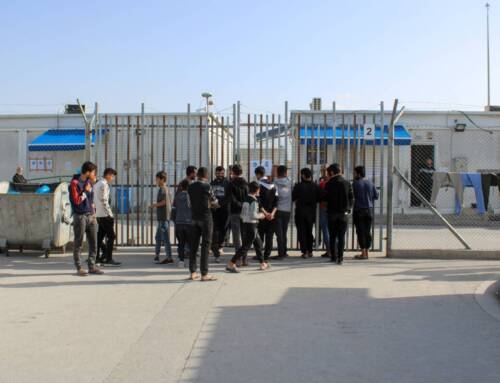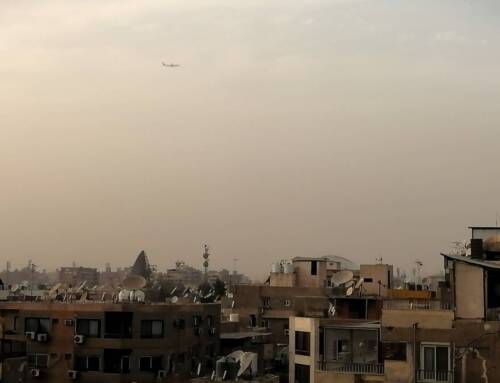3 women’s stories: Unlicensed law offices promise answers about the disappeared
Earlier this month, the UN Human Rights Committee reported that tens […]
2 March 2016
Earlier this month, the UN Human Rights Committee reported that tens of thousands of prisoners currently remain in regime custody: “Since March 2011, a countrywide pattern emerged in which civilians, mainly males above the age of 15, were arbitrarily arrested and detained by the Syrian security and armed forces or by militias acting on behalf of the Government during mass arrests, house searches, at checkpoints and in hospitals.”
Detainees “were almost always denied any means of contacting their families,” concludes the UN report. Due process, it should be noted, is not required by Syrian law.
In Damascus, a new industry has emerged around the disappeared. Unlicensed law offices in the capital are exploiting families’ desperation to find their loved ones who have disappeared in regime prisons.
These lawyers operate in unmarked offices, many of which are located in the Mezzeh 86 neighborhood, a young man from Daraa whose brother has been in regime custody for two years told Syria Direct. What they are selling is the prospect of information via connections with regime officials.
More often than not, after they take huge sums of money from relatives, up to SP 5,000,000 ($22,750), they either fail to find the disappeared or end up informing their families that they are dead.
One lawyer who spoke to us from Damascus, on condition of anonymity, admitted that law offices specialized in finding the disappeared “exist, but in secret and unofficially.”
Below, three women who used three different law offices recount what happened while searching for their loved ones.
Taher’s wife, Damascus
My husband was detained more than a year ago. He’s an employee at an organization that deals with food supplies. He was going to pick up groceries from the market, and as he was returning he was arrested at the a-Zahira checkpoint close to our house. One of the neighborhood residents told me he had been arrested.
My husband was a man who kept to himself—from home to work and work to home. When I went to the checkpoint and asked why he had been arrested, they gave me a lawyer’s number and told me that he could help. I went to the lawyer, and as soon as I began to talk, he told me that my husband’s case was simple but would cost a lot of money and asked me if I could pay.
I told him yes, the important thing is to get my husband back. The lawyer contacted me later and told me there was information available, and to come to his office. He informed me that my husband was being held on 10 different charges. He said it was impossible for him to get out of prison [by normal means]—he was at Adraa prison—but that I could get him out after a week by paying SP1,200,000 ($6,355). My brother-in-law is in Jordan, I asked him for the sum and he sent it because it’s his brother.
[Ed.: Adraa prison, located in the East Ghouta suburbs of Damascus, is Syria’s largest. It housed military detainees before the revolution and now is home to political prisoners, among others].I paid the money. Every week for the past three months the lawyer tells me “he’ll get out this week.”
Um Ilfet, Jordan
I’ve been working to secure my daughter’s release for three years. She was arrested in May 2013, in the a-Tadamon neighborhood [in south Damascus], when security forces stormed her house to take her husband who worked for the revolution filming protests. They didn’t find him, so they arrested her with her brother-in-law.
I know that everyone [who promises to provide information on her whereabouts] is a liar, but I’m like a drowning person grasping at straws. I’ve met a number of people who were supposed to get her out of jail. They all demand money and I send it to Syria, or Lebanon, in vain.
I met people who told me about a lawyer who could help me. The lawyer asked me to transfer him SP50,000 ($265) so he could open the file and learn where my daughter was being held. I transferred him the money, and after a time he told me that he wanted to connect me to an officer [who had information], but that I needed to transfer another $2,000.
After a week I transferred the money, under the assumption that the officer would secure my daughter’s release in a prisoner exchange [with the rebels]. The officer came back and demanded that I transfer another $4,000 to Lebanon. I did it, and after a time when I tried to reach the officer [his colleagues] told me that the rebels had killed him. The lawyer stopped talking to me.
Fadia, the wife of Mazeed, Homs
My husband Mazeed was arrested on February 3, 2013 when he want to work. My husband is a 40-year-old administrative employee in Homs city and has five children. The day he was arrested, I waited impatiently for him to return, but he never showed up. I called his friends at work who said that he didn’t come in that day, and they hadn’t seen him.
My husband’s parents asked relatives about him, and searched local hospitals, but they didn’t get any information. An employee at one of the security branches told me that he could obtain my husband’s whereabouts, but I would need to pay him SP10,000 ($53). I paid the sum, but got no information on my husband.
The employee told me that he had given the money to an important officer and couldn’t get it back. This same experience happened over and over again, until a lawyer told me that my husband was at the central prison in Damascus.
The lawyer told me that if I wanted him to get out of prison, I needed to pay SP1,000,000 ($5,296). I agreed and paid the sum, but didn’t get any information on my husband. When I went back to the lawyer to get the money, which I borrowed from my family, and which I sold my personal jewelry to secure, the lawyer said that the sum was already paid and if I wanted to complain, ‘the police are over there—go complain.” He was laughing.
Since my husband’s arrest I don’t know anything about him. I’ve lost my husband, I’ve lost my house. I’m raising my children on my own, hoping that my husband is still alive. I won’t ever lose hope.







